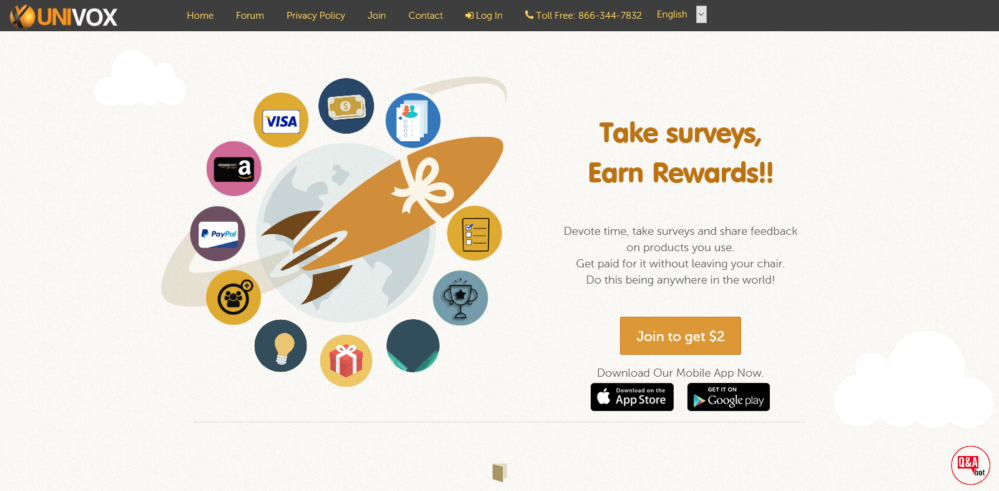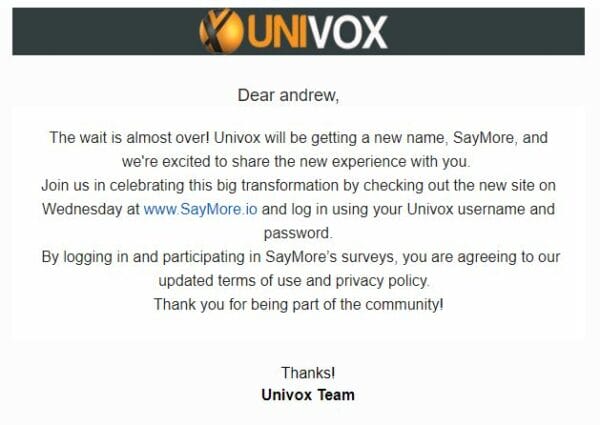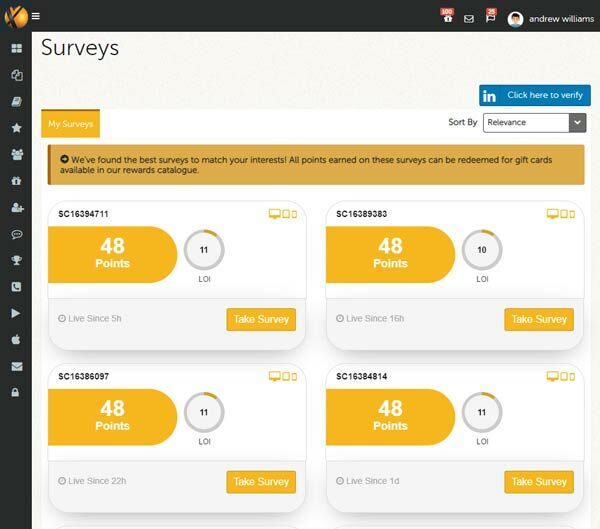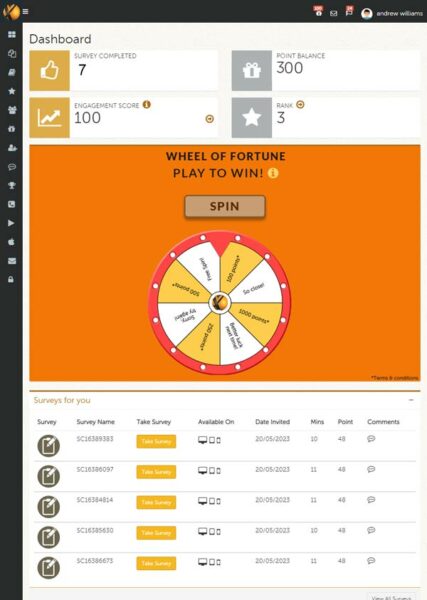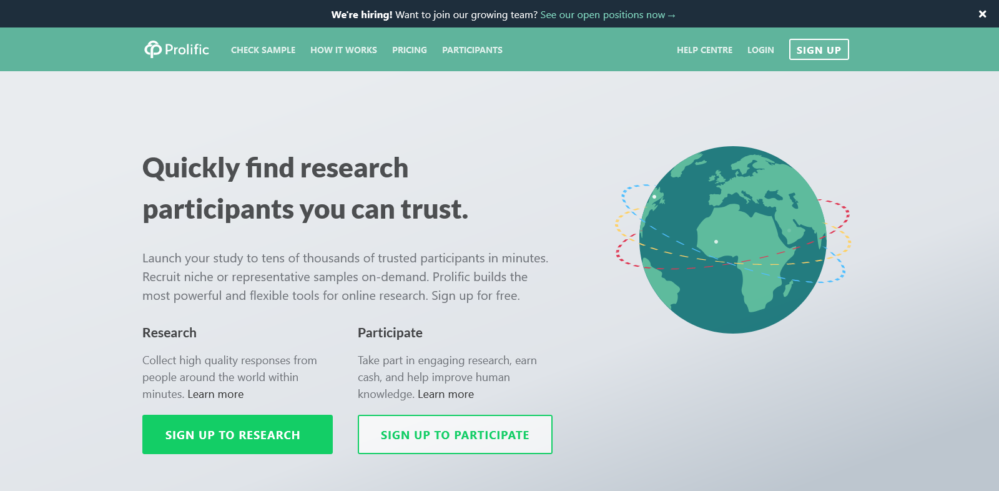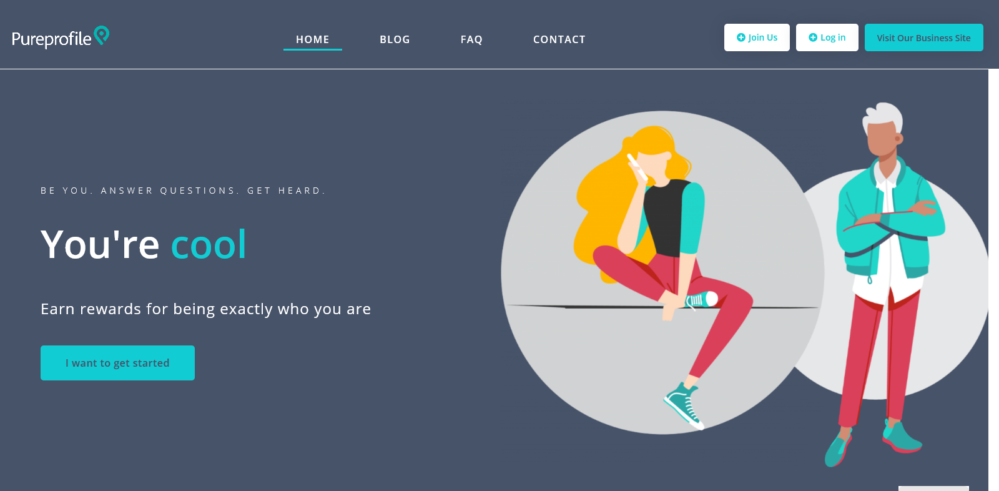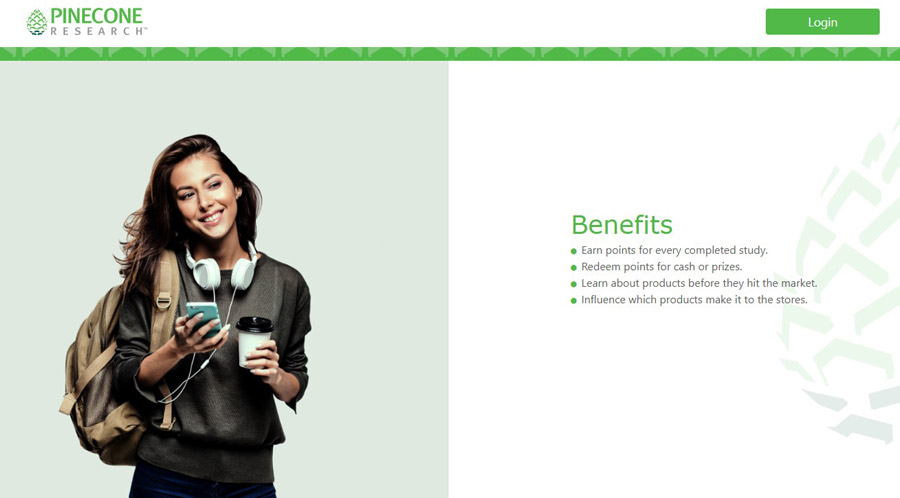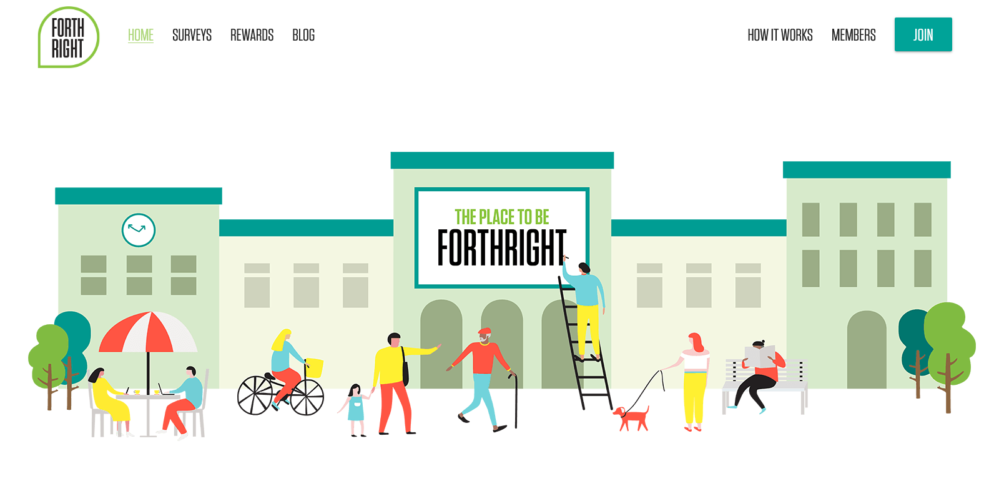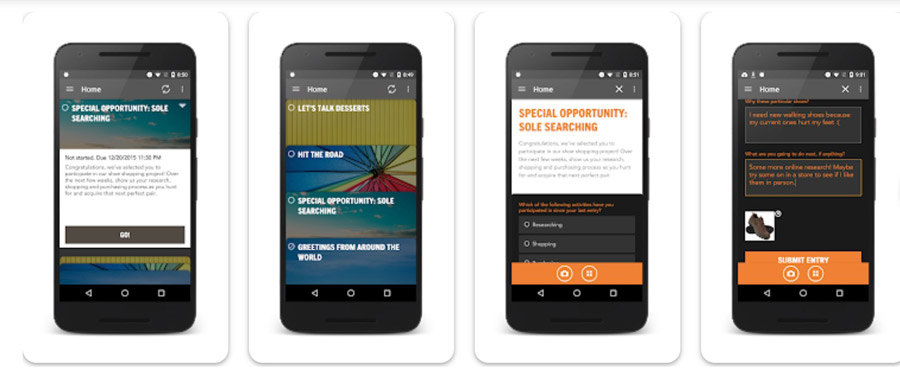Update: Univox Community has changed its name to SayMore.io
Univox Community – Survey Site Review
Univox Community is a survey site that promises to reward users for sharing their opinions. Is this really the case? In this review, we’ll take an honest look at the benefits and drawbacks of joining the Univox Community.
Is Univox Community a legit survey site?
Yes, Univox Community is a legit survey site owned by Market Cube, which was acquired by Sago (previously Schlesinger Group) in 2020. Sago is a well-known provider of research participants in the market research industry and is a member of ESOMAR, one of the most important market research associations globally. The ESOMAR membership signifies that Univox Community follows ethical guidelines and upholds certain standards in data collection and research practices.
What’s the concept?
Univox’s owner Sago capitalizes on valuable market research data generated by its users, selling it to clients seeking consumer insights.
By offering rewards, Univox Community creates an environment where users willingly divulge their opinions, preferences, and personal information. This treasure trove of data becomes the foundation of Sago’s business model, which revolves around packaging and selling this information to market research clients.
To help you get the full picture, here are two typical examples of surveys:
Tech-savvy Generation Z: In an attempt to understand the preferences and habits of the digitally native Generation Z, Univox Community might conduct a survey targeting individuals aged 16-24. Questions could revolve around their preferred social media platforms, online shopping habits, smartphone usage patterns, and attitudes towards privacy. This data, once collected and packaged by Sago, becomes a valuable resource for marketers looking to tap into the rapidly evolving consumer behaviours of this demographic.
Luxury travel enthusiasts: Univox Community may also target a group of individuals with a penchant for luxury travel experiences. Through a survey tailored to their preferences, the platform could explore topics such as preferred travel destinations, accommodation choices, expenditure patterns, and the influence of social media on their travel decisions. This data becomes a valuable asset for travel companies and tourism boards seeking to refine their marketing strategies and design exclusive experiences for this specific consumer segment.
Reviews on other sites
- Based on 1,029 reviews on trustpilot.com, Univox Community has an average rating of 3.6 out of 5 stars. The most common positive feedback is that the site pays well and is easy to use. The most common negative feedback is that the site has technical issues, disqualifies members from surveys frequently, and has poor customer service.
- Based on 1,347 reviews on Google Play Store, Univox Community has an average rating of 3.4 out of 5 stars. The most common positive feedback is that the app is easy to use and has a variety of surveys. The most common negative feedback is that the app crashes often and does not credit points properly, and has a slow payment process.
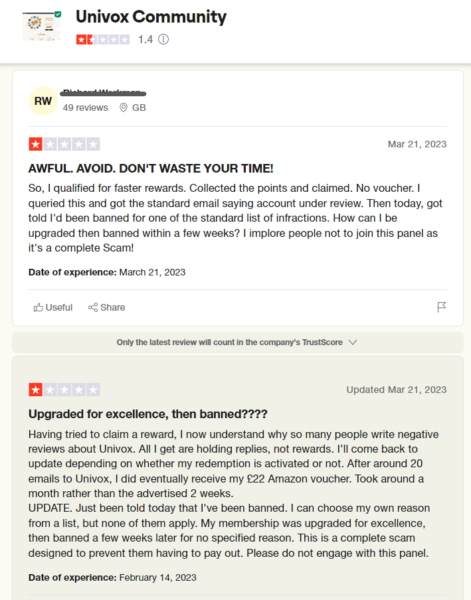
One of many Univox users complaining about account suspension (from Trustpilot).
A lot of the complaints on Trustpilot seem to be related to blocked accounts. HuginX’s view on this: We 100% understand that survey sites require honest and attentive answers from their survey takers. This is the foundation for legitimate market research. If the underlying data cannot be trusted, the research is worthless.
However: Allowing survey takers to take a high volume of surveys before eventually suspending their account after months of activity feels very unfair to the respondent. That’s why it’s crucial for survey platforms to establish clear guidelines and detect dishonest answers or false information early on as soon as the user is registered.
Complaints on BBB
The company has a rating of only 2.33 out of 5 stars on the BBB (in August 2023), with a total of 35 complaints registered in the past 3 years.
Some of the most common complaints include issues with payments, particularly delayed payments or payments not being made at all. Many customers have also complained about being disqualified from surveys after spending significant time and effort answering preliminary questions. Other complaints have been related to poor customer service, with customers feeling ignored or brushed off when trying to resolve issues with the company.
While it’s worth noting that not all customers who use Univox have negative experiences, the sheer volume of complaints raises some concerns. In particular, the issues with payments and customer service suggest that the company may not always be prioritizing the needs and concerns of its survey takers.
It’s also worth noting that Univox has been slow to respond to many of these complaints on the BBB website, with some customers reporting that they have not received any response at all.
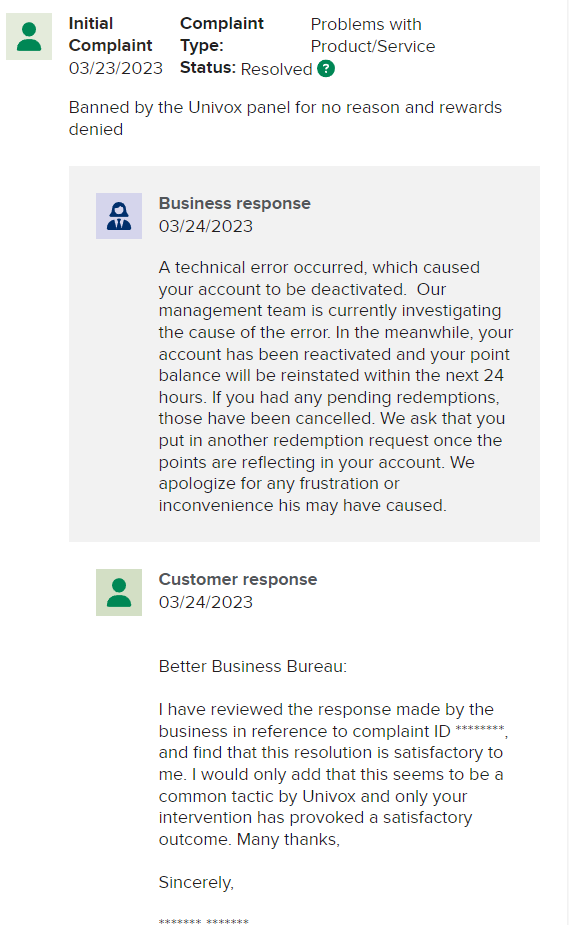
Example of a complaint to Better Business Bureau (BBB) in March 2023 where Univox admit to a “technical error” causing account suspension.
It is important to strike a balance between accuracy and inclusivity. Univox community’s strict policy might make sense from a business point of view, but it must also be careful not to upset its community. Ultimately, a nuanced and thoughtful approach to fraud detection in combination with responsive member support is necessary to achieve a good user experience.
How much can you earn on Univox Community?
It’s easy to get tempted to join with the prospect of earning different types of rewards such as PayPal payments, Amazon vouchers, and debit cards. However, a closer examination of the reward system reveals some limitations that users should be aware of before dedicating their time and efforts to this platform.
Based on our experience, an average survey on Univox Community is worth 30 – 50 points. With a redemption threshold set at $25, where each point holds a value of $0.01, users must accumulate a substantial number of points before they can claim their rewards. Doing the math, it becomes clear that an average survey is worth around $0.40 (40 points x $0.01 per point), meaning that users need to complete A LOT of surveys to reach the initial $25 payment threshold for basic users.
On the positive side, Univox has implemented a loyalty program which rewards users that consistently take surveys over time:
Univox offers four distinct user levels, each having its own set of point thresholds for point redemptions:
- Ambassador users: The redemption button becomes active once 1000 points ($10) have been accumulated.
- Premium users: The redemption button becomes active once 1500 points ($15) have been accumulated.
- Verified users: The redemption button becomes active once 2000 points ($20) have been accumulated.
- Basic users: The redemption button becomes active once 2500 points ($25) have been accumulated.
The more active you are, the higher level you achieve. As an example, you move to “Verified” status after 3 or more redemptions.
It’s also worth noting that Univox Community does offer a join bonus of 200 points ($2) to new members. While this bonus provides a small boost to the user’s points balance, it does not significantly alter the overall calculation. Even with the join bonus factored in, users still need to complete a substantial number of surveys before they can redeem their earnings.
The risk of account suspension and forfeited points
The Univox community survey site has implemented a strict fraud detection policy aimed at ensuring the integrity of its data collection process. While this policy has its benefits, it also has its downsides, and the debate over its efficacy is a contentious one.
On the one hand, the pro argument for having a strict fraud detection policy is clear. Accurate data is crucial in any research endeavour. After all, the Univox community’s goal is to provide reliable, trustworthy data. By detecting and preventing fraudulent responses, the site ensures that its data is representative of the population it is studying. Additionally, the site’s strict policy can act as a deterrent, dissuading potential fraudsters from attempting to skew the results.
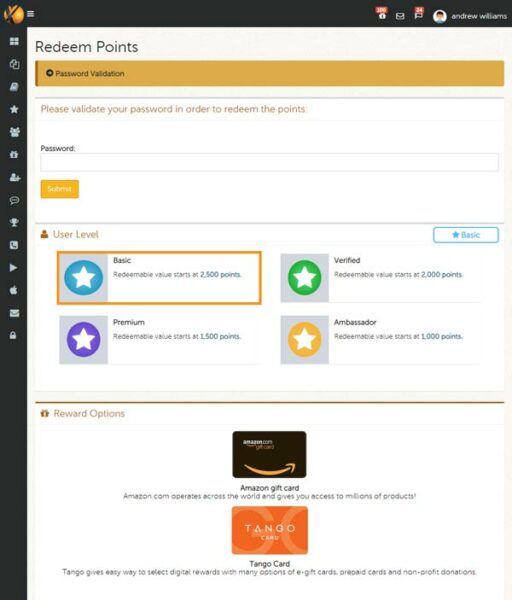
Univox rewards page: If you reach a higher status, the redemption threshold is reduced and you get access to additional reward options such as PayPal.
On the other hand, a policy driven by aggressive anti-fraud algorithms can result in a high number of false positives, which can lead to legitimate users having their accounts blocked without justification. This can cause frustration and disillusionment among users who are genuinely interested in participating in the surveys.
Summary – Pros and Cons
Positives.
On the positive side, the platform offers real payments in the form of PayPal, virtual master cards and gift cards. Additionally, the join bonus is a welcome incentive for new members, giving them a head start in accumulating rewards. The inclusion of a disqualification reward also ensures that users receive some compensation even when they don’t qualify for a survey, which is a commendable feature. We also like the loyalty program, which shows that Univox cares about its most consistent survey takers.
Moreover, Univox Community’s affiliation with a legitimate market research company (SAGO) and its membership with ESOMAR adds a level of credibility, assuring users that their opinions are being used for genuine research purposes. Sago is one of the most trusted suppliers of data collection solutions for the research industry, and they adhere to local data protection regulations across the world.
Negatives.
On the negative side, there are some drawbacks to consider. The high payout threshold for basic users ($25) is a notable concern, as users must accumulate a substantial number of points before they can request a payment. This can be frustrating and time-consuming for those looking to cash out their earnings promptly.
Also, the platform’s support system has been reported to be slow, with users experiencing delays when encountering issues or inquiries. Another concerning aspect is Univox Community’s reputation for being quick to block user accounts without clear explanations, resulting in the loss of accumulated rewards and a sense of unfairness.

